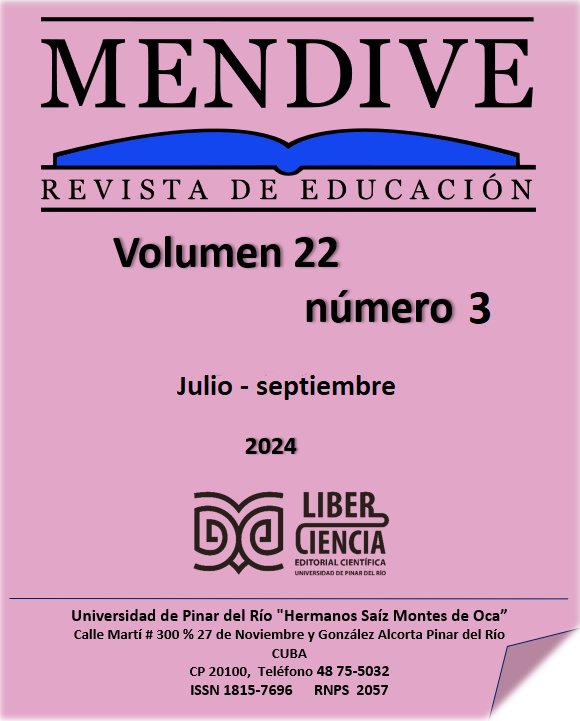The direction of substantive processes: challenges for the director in Basic Secondary Education
Main Article Content
Abstract
The competence of the directors of the Basic Secondary School in institutional projects led to the analysis of educational problems and generated responses in light of the transformations in the Third Improvement of the National Education System and of pedagogical and curricular innovation, to guarantee educational quality. The objective was directed to socialize a research about the preparation of the director in the Basic Secondary School in the technical-professional content, to lead the substantive processes, with a theoretical and practical professional mastery. A methodology was applied to contribute to the improvement of educational management, with didactic-methodological procedures that facilitated the mastery of the contents of this competence for its practical application. Methods of the following levels were used: theoretical, empirical and statistical-mathematical. The main results were in the contribution to the theory, which integrated a system of knowledge, skills and capacities of the competence in management, applied to the substantive process of educational management, for the development of institutional projects at the educational level; and in practice, in the methodological procedures for participative management, socialized in pedagogical practice. The concepts of competence in management and participative management were specified and contextualized; the characterization of the educational management process and the elaboration of requirements and features that typify the proposed methodology. In conclusion, the need for the formation of work competencies in managers of strategic sectors for efficient local development is confirmed.
Downloads
Article Details

This work is licensed under a Creative Commons Attribution-NonCommercial 4.0 International License.
References
Bastida Lugones, L. y Mora Quintana, E. C. (2017). La dirección educacional y la dirección en la escuela: sus especificidades. Universidad y Sociedad, 9(3), 34-38. http://scielo.sld.cu/pdf/rus/v9n3/rus05317.pdf
Bastida Lugones, L., Remón Amarelles, A. Y. y Cuéllar Gutiérrez, M. (2024). La preparación del director municipal de educación para la conducción de la concepción curricular: una mirada desde la ciencia y la innovación. Revista Mapa, 10(34), 174-199. http://revistamapa.org/index.php/es
Bringas Linares, J. A. y Carbonel Pérez, J. E. (2010). Contribución al concepto de dirección educacional. Varona (51), 11-21. http://www.redalyc.org/articulo.oa?id=360635569003.
Duartes Monje, C. A. (2022). La dirección educacional y su impacto en la calidad del proceso educativo escolar en Chile. South Florida Journal of Developmen,3(6), 6803-6816. https://ojs.southfloridapublishing.com/ojs/index.php/jdev/article/view/1929/1506
Fernández Mijares, A. y Rojas Hernández, L. (2020) Consideraciones teóricas acerca de la participación en el proceso de dirección de las instituciones educativas. Varona. Revista Científico Metodológica, (70), 103-107. http://scielo.sld.cu/scielo.php?script=sci_arttext&pid=S1992-82382020000100103&Ing=es&Ing=es
Justiz Carrión, Y., Katt Justis, O. y Brito Sierra, Y. (2022). La gestión educativa en las estructuras municipales para la transformación de los procesos de dirección. ROCA, 18(4), 1-15 http://portal.amelica.org/ameli/journal/440/4403496032/
Organización de las Naciones Unidas para la Educación, la Ciencia y la Cultura (Unesco). (2018). La Agenda 2030 y los Objetivos de Desarrollo Sostenible: una oportunidad para América Latina y el Caribe. Santiago de Chile.
Ramos Bañobre, J. M., Marichal Guevara, O. C., Mazariegos Biolis, W. R., Dorta Martínez, M.E., Vidal Pla López, R., Moscoso Portilla, O.M., Hinojo Lucena, F. J., Cáceres Reche, M. P., Trujillo Torres, J.M, Abreu Valdivia, O. y García Rodríguez, J.A. (2023). Sistema para la gestión de la formación permanente en los directivos educacionales. Dykinson. https://dialnet.unirioja.es/servlet/libro?codigo=898021
Salvador Oliván, J.A. y Fernández Ruíz, M. J. (2012). Mapa de procesos de un sistema de gestión de accesibilidad en un servicio web de la administración pública: el ayuntamiento de Zaragoza. El profesional de la información,21(3), 312-318. http://eprints.rclis.org/17077/1/EPI-312-318.pdf
Samá Muñoz, D. y Cruz Álvarez, Y. (2018). Calidad de los procesos sustantivos. El proceso de Posgrado en la Universidad Agraria de La Habana. Estrategia y Gestión Universitaria, 6(1), 43-61. https://revistas.unica.cu/index.php/regu/article/download/990/1235/4745


